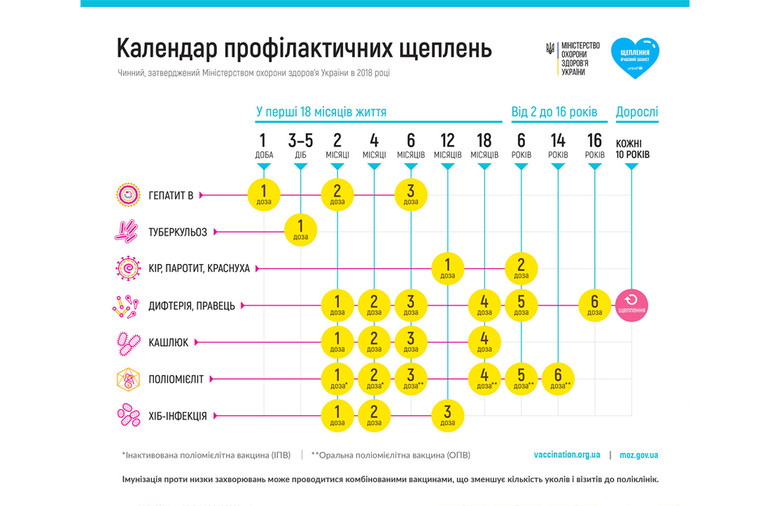Changes in the vaccination calendar and « Holivara » around hepatitis B. What is important to know – publications

In Ukraine, the vaccination calendar is changed. What will be different now?
So far National Calendar of Preventive Vaccinations Provides immunization against 10 diseases: tuberculosis, hepatitis B, measles, epidemic mumps (pigs), rubella, diphtheria, tetanus, cough, polio and polio and Hib infections.
However, a number of vaccines that are mandatory in other countries are lacking on the national vaccination calendar.
The changes will also apply to the age of vaccination for certain diseases.
We talked to a child infectious specialist and head of the National Technical Group of Experts on Immunoprophylaxis Fyodor Lapii About all the nuances, as well as contradictory moments of innovations.
What changes are expected?
Currently, the vaccination calendar in Ukraine looks like this:
The key on the calendar of preventive vaccinations will be Vaccination against human papilloma virus (HPV) for girls aged 12-13 years.
The vaccine will be purchased at the expense of the state budget and will be used on a single -dose vaccination scheme. Such vaccination schemes have proven effectiveness and are already used in many countries. For patients the vaccine will be free.
Introducing this vaccine will become available From January 1, 2026.
Another change that is important to remember is that Shift of the second dose of the CCP vaccine (measles, epidparotitis, rubella) from 6 years for 4 years, which is in line with the practice of many European countries. And in Our situation will provide protection for children of priesthood.
The third change concerns hepatitis B. vaccination. It is criticized in the patient and medical communities.
In this text, we will try to understand what they have changed, why and what it can have consequences for society.
What is important to know about hepatitis B vaccination
Hepatitis B is viral disease that affects the liver and mainly transmitted through blood or sexually. Often the baby is infected with the mother if he has a virus in the blood. Hepatitis B vaccination It is extremely important for children in the first years of life, especially for babies, for whom infection with this type of hepatitis in 95% It ends with a chronic form of the disease. At the same time in adults this figure is only 5%.
On the calendar of vaccinations that they want to change, vaccination against hepatitis B is carried out on the first day of life, then at 2 and 6 months.
Now they offer vaccination against hepatitis B in 2-4–6–18 months.
According to the CGZ, this will allow you to use modern combined vaccines, not just a separate hepatitis vaccine, as is done now. Combinations are simultaneously protected from several infections, reducing the number of injections and visits to your child.
However, such a proposal provoked a discussion primarily among doctors. For example, breastfeeding consultant and baby nurse Victoria Ivanova wrote on her page in Facebook:
« What do I say to my pregnant women today? What from now on hepatitis B vaccination has ceased to be important for everyone? »
Solutions are based on data that is not
Why did the question of changes in hepatitis have arisen in general?
First of all, in most EU countries, only babies at risk are vaccinated in the maternity hospital, that is, those whose parents already have hepatitis B. others are vaccinated at 2 months, as is now being offered in Ukraine.
Pediatric infectious specialist and head of the National Technical Group of Experts on Immunoprophylaxis Fedor Lapiy explains that, in particular, the Institute of Epidemiology and Infectious Diseases. Gromashevsky has repeatedly requested to cancel hepatitis B vaccination in maternity.
According to the infectious disease specialist, the main argument for such changes was the fact that the data showed the low prevalence of hepatitis B antigen (HBS-antigen, that is, an antigen that indicates a virus infection) among the population, namely 0.5-0.6%.
However, are the data on which such decisions are made are reliable enough? Do they reflect the real situation with viral hepatitis in society? That’s where there is doubt.
After all, low rates may well be a sign of insufficient diagnosis, not low disease.
”These data are primarily based on indicators that pregnant women have. However, there are doubts whether it can be extrapolated to a population: for a year for a year 30 million we register approximately 190 thousand pregnant women. And even in this segment, the level of screening of pregnant women is low enough, which can lead to inaccurate data on the prevalence of the virus. For example, only about 50-60% of pregnant women in 2022-23 were tested for hepatitis B, which calls into question the accuracy of statistics about its prevalence. And what is the prevalence of those who have not passed screening? We do not know that« , – says Fedor Lapi.
Hepatitis B vaccination was introduced into the Ukrainian vaccination calendar in 2000.
And in 2002, according to Fyodor Lapi, children began to be massively vaccinated in maternity hospitals.
However, anti -accinal misinformation has played a role here.
There were many rumors and misinformation around hepatitis vaccination, both among the patient community and medical representatives.
Statistics show that much has changed since then.
”According to statistics for 2024, 72% of children were vaccinated against hepatitis B maternity. That is, approximately a third of children is discharged from the hospital without hepatitis vaccination« , – says Lapiy.
And then there is a logical question: who is more inclined to give up vaccination? Women who have passed screening or those who have neglected this opportunity? We do not know this either.
Therefore, in many ways, the decision to cancel vaccination in maternity is not supported by serious data.
Which, unambiguously, is a serious minus of these changes.
Displacement of accents and nuances that can work
However, some features of Ukraine have taken into account. What exactly? For example, according to Fyodor Lapi, the recommendations were prescribed in such a way that a unstable mother is also a conditional risk group. That is, to vaccinate in the maternity hospital will be both those babies, whose mothers were determined by hepatitis B at the stage of pregnancy and newborns of women who have not been tested for childbirth.
”If there are no hepatitis screening results, then the child will undoubtedly engaged in maternity. And not surveyed we have 60% According to the results of 2024. Also, the risk group is those who have hepatitis B in a history of, or have diagnosed hepatitis C or HIV, as well as infants who, at birth, have a pathology that requires surgery. Such babies will be vaccinated even with a negative result for hepatitis B mother. So we can cover more people from a risk group« , – says the dmatic infectious specialist.
He also adds that among doctors, especially narrow specialties, there is a tendency to refuse vaccination before surgery because of almost superstitious opinion that it may somehow harm.
Now that this issue is regulated by the order, it will be easier to get around.
Combined vaccines, flexibility and economic expediency
Vaccine deficiency is always a terrible dream for the public health care system.
And if you talk about the country in a state of war, then flexibility is needed as ever.
”We will constantly « find » about what we will vaccinate in a year? After two? It is very difficult for us to choose vaccines for the vaccination calendar. We have a program but no contracts a few years ahead. Having flexible recommendations, it will be easier for us to choose manufacturers, relying in particular on the price of vaccines« , – says Lapiy.
And yet, a combined vaccine is … protection against medical ignorance.
There is no question in the « bubble » of progressive parents and doctors whether or not a child is vaccinated with something. However, it is only a « bubble ».
”We still have problems with the skepticism about vaccines. And there are still doctors who invent some of their own schemes, agreeing to vaccinate from one and abandoning the other. And we have to take this into account. Combined vaccines reduce the risks that the child is not receiving something« , – says the infectious specialist.
He adds that the transition to combined vaccines facilitates the delivery, logistics, storage, input, the cost of disposal of medical waste, etc.
When asked by many parents, whether they will be able to vaccinate the child at the request of Fyodor Lapiy says that « rather. »
He hopes that it will be possible to provide explanations through information letters that will allow them to vaccinate children in a hospital, even if the family is not at risk.
Therefore, on the one hand, changes in hepatitis vaccination can be a strategically good solution and, as a result, in the population, more children will receive proper protection.
But the fact that such decisions are made not on the basis of clear data, but essentially on hypotheses – is a serious disabilities of our health care system. And not only in the context of vaccination.
Natalia Bushkovskayaespecially for UP. Life








